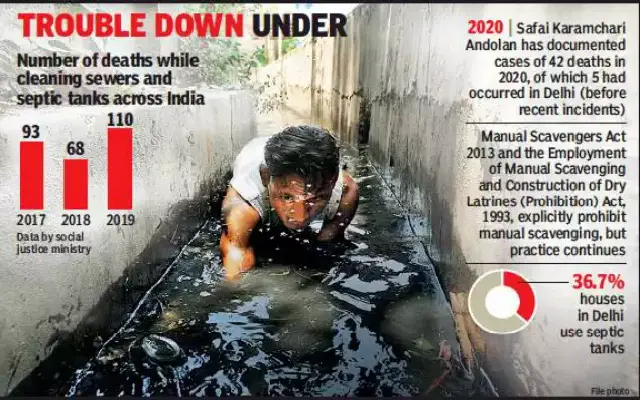Raju’s brush with death in a septic tank remains etched in his memory—a harrowing experience that almost claimed his life. But his survival was merely a stroke of luck, contrasting sharply with the tragic fate of others who weren’t as fortunate. In the past month alone, Mumbai witnessed two incidents of manual scavenging, resulting in multiple deaths and injuries, underscoring the persisting menace of this illegal practice.
The first incident, on March 21, saw three members of a family lose their lives after entering a public toilet tank at Ambujwadi. Tragically, on April 24, another worker met a similar fate while cleaning a sewer chamber in Malad East, with one of two brothers attempting to rescue him also succumbing to toxic gases. Despite being outlawed under the Prohibition of Employment as Manual Scavengers and their Rehabilitation Act, 2013 (PEMSR), manual scavenging continues to plague Mumbai due to systemic failures and negligence.
The Brihanmumbai Municipal Corporation (BMC) claims to have eradicated manual scavenging, citing the use of machines for sewer and septic tank cleaning. However, recent fatalities paint a starkly different picture, exposing the gap between official assertions and ground realities. Activists argue that the BMC’s claims are unsubstantiated, with data suggesting otherwise. Despite assertions of ‘NIL’ recorded incidents, data from the BMC’s disaster management cell reveals multiple cases of deaths due to drowning in septic tanks between 2019 and 2024.
Limited infrastructure exacerbates the problem, with only a handful of machines available to clean Mumbai’s extensive sewer network. Slum dwellers, where many septic tanks are located, struggle to afford the exorbitant charges for BMC cleaning services, resorting to cheaper, but riskier, manual cleaning methods. The tragic fate of the Kevat family serves as a poignant example of this injustice—forced to clean a public toilet due to BMC’s negligence, they paid a heavy price for a service that should have been provided by the authorities.
The plight of manual scavengers reflects wider societal inequalities, with most workers belonging to marginalized Dalit communities. Despite their indispensable role in maintaining urban sanitation, they face abysmal working conditions, inadequate remuneration, and a lack of safety measures. Women, in particular, endure additional challenges, including harassment and unsafe working environments.
Efforts to address the issue have been insufficient, with calls for a complete ban on manual scavenging and improved rights for sanitation workers falling on deaf ears. While the BMC has taken some steps, such as issuing guidelines and deploying machines for cleaning, these measures remain inadequate. Strengthening enforcement mechanisms, increasing awareness, and providing adequate compensation to victims’ families are essential steps in addressing this humanitarian crisis.
The recent directive from the Bombay High Court, urging the Maharashtra government and municipal corporations to enforce the ban on manual scavenging rigorously, is a welcome move. However, meaningful change requires sustained efforts at both the policy and grassroots levels. Measures such as simplifying the process of procuring BMC machinery, ensuring safety gear for workers, and providing financial support to victims’ families are imperative in ending this deplorable practice.
Ultimately, the fight against manual scavenging demands collective action—from government authorities, civil society, and citizens alike. Only through concerted efforts can Mumbai ensure dignity and safety for all its residents, regardless of their occupation or social status. As long as manual scavenging persists, the city’s claim to progress and development will remain hollow, tarnished by the suffering of its most vulnerable citizens. It’s time to confront this dark legacy and pave the way for a future where every life is valued and protected.




